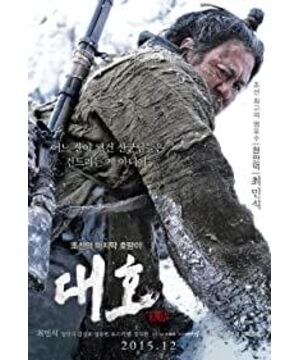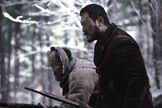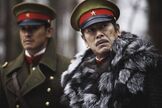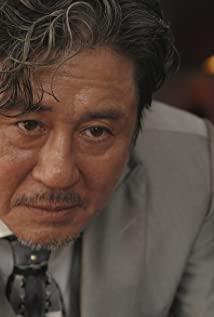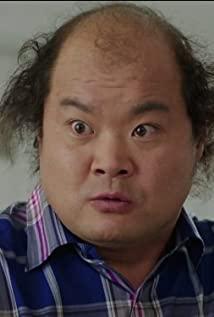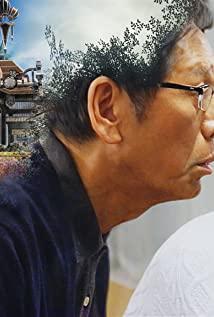But this time, "Big Tiger", which was labeled "War", attracted me only by one point, and that was the starring Choi Min-sik. This actor, who started to show his temperament from "Life and Death", is well known to us for his character in "Old Boy". Last year, I concentrated on watching several of his films after 2010, "War with Crime", "New World", "Ming Liang Sea Battle" (2010's "Saw the Devil" was not downloaded), Cui Minzhi officially started after the age of 50 He is so cool that he has no friends. In the future, his movies are expected to be watched on his knees. Song Kanghao, the big-faced king, will not talk about him when he turns 50 next year. With "Memories of Murder", he can hang and beat young Korean actors for 20 years. Although the two-faced king Sun Xianzhou can be regarded as a drama bone, some of the performance styles of facial paralysis are not sharp enough. Han Shigui, who has performed too many romantic and literary films, is not tough enough.
—————————————————The topic dividing line—————————————————The
film tells about the period of Japanese occupation, around the colonists- Tiger Catcher - Tiger, a story that happened in Jirisan Mountain, the Korean sacred mountain. As one of the most YY people in the world, the movie was injected with the standard Korean drama color, realizing the transformation from "Wusong Fighting Tiger" to "Jiri Mountain Two Heroes". But this kind of commercial national theme can easily arouse the resonance of moviegoers. The mountains in the sky and the snow are majestic, and the vast space gives people a sense of solemnity, while the tiger hunter created by the actor Cui Minzhi is calm and weak in appearance, but inwardly However, it is like a capped mountain, hiding extremely heavy emotions - from man to god in the end. The tiger produced by CG special effects is basically technically qualified. As the "male No. 2" in the film, it is humanized to the point of becoming refined. The director also arranged a wealth of inner scenes... It is responsible for making the audience's blood ignite, and also The guardian of the incarnation of the nation evokes tears - from the god of the mountain to the god of the nation.
The special background of the Japanese occupation period is the best time to generate a sense of national resonance and build a national spirit. In the film's several villains, the director appears ambiguous when dealing with "his own people". 1: An officer of the Japanese army of Korean nationality, this officer who "deeply loves" his position has always been hesitant in catching tigers. He knows the status of the tiger in the hearts of the Koreans as the god of Jiris Mountain, but he is a Korean national. His identity forced him to bow before his superiors. He was a little character with impure blood in the Japanese military camp. He was eager to get real recognition. , in exchange for his position in front of his superiors, and he refused to let the regular Japanese artillery team assist in catching tigers. 2: The captain of the tiger hunter, he is the most willing to kill the tigers. This Korean hunter who serves the Japanese is highly consistent with the Japanese in catching tigers. But he is not a "dog-leg" in the theme of conventional warfare. He also has his own inner entanglement and dignity. In this character, you can see both his hateful side and his moving parts. The reason why he killed the tiger was not simply to please the Japanese, the film made him appear as a victim of Dahu (he was slapped in the face, half of his face was disfigured; at the same time his wife/girlfriend was also killed by Dahu) , so his motive for catching tigers was revenge, and he died in the mountains in the most perfect way as a hunter. Although these two characters hastened the death of the protagonist and Dahu, the director still did not label them as obvious villains. The contradiction between the North Koreans was deliberately made by the director to make them less intense
. It is important for the film to achieve an emotional leap and deepen the theme. The method is to add tragic color, and finally rise from personal tragedy to national tragedy. As an excellent hunter, Qian Mande (Cui Minzhi) suddenly led his only son to live a hermit-like life after experiencing several "mysterious" (not explained at the beginning of the film) encounters. The first climax of "Fate" lays the groundwork.
He has a very tangled relationship with Dahu, a reclusive hunter and a desperate tiger. As the film progresses, the entanglement between him and the big tiger makes them almost integrated, reaching a state of indistinguishable people and tigers. Although the simple plot of the tiger tearing the Japanese devils by hand can temporarily arouse the blood of the moviegoers, it is deeply Only the injection of national emotions in the hierarchy can make this kind of wishful thinking slaughter full of justice. In order to achieve this, the screenwriters took great pains and finally made the movie full of Korean drama flavor. First of all, the relationship between this divine beast and Qian Mande can be said to be a bad relationship, which is why the title is called: Human and Beast Abnormality.
In the early years, Qian Mande killed the big tiger's mother---Qian Mande rescued the big tiger, which was still a tiger cub, and raised it for a period of time-later, because of the interference of the big tiger (actually the big tiger was also killed. Helpless, I will explain later) Qian Mande mistakenly killed his wife——Qian Mande blamed himself and went into hiding with his son——The Korean hunter killed Dahu’s wife and children——The Korean hunter, the Japanese army and Dahu PK , Qian Mande's son was accidentally killed by Dahu (he was forced to kill by Dahu, in a sense, it was a kind of manslaughter) -- Qianmande and Dahu finally jumped off a cliff and perished together...
The director gave the tiger enough inner drama, gave it the same emotional expression as a human being, and performed the instinctive self-defense and revenge as wonderful as helping the Koreans fight against Japan. This kind of setting achieves the best tear-jerking and emotional effects in the movie, so the tiger is gradually transformed into a hero, but at the same time, this "hero" is constantly tortured and attacked (the wife and children were killed, and all kinds of Chase and kill), put it in a tragic situation; Qian Mande lost his wife, and then lost his son, the only spiritual sustenance, his retreat was not allowed him to escape the tragedy, and the film did not show too much about this. The heroic appearance of a highly skilled hunter almost always depicts his passive and reclusive state, constantly pouring his emotions towards his son in front of the screen, which brings the most shocking blow to the tragic death of his son. Both the man and the tiger were gradually forced into a desolate situation. They lived together in Jirisan Mountain for more than ten years. There are many scenes in the film of the protagonist and the tiger looking down at the village from the cliff. There is some kind of guardian image, which deepens their image. When it was finally discovered that Qianmande's secluded home was actually facing the tiger's lair on the top of the mountain, it turned into a guardian and bond between them. Qian Mande used his "emotional bond" with Dahu to make it live peacefully in Jirisan Mountain, at least harmless to ordinary Koreans. At the beginning of the film, we found that this tiger occasionally killed the Japanese. This is the Japanese The immediate reason for wanting to kill it. Qianmande, on the other hand, has always been determined not to cooperate with the Japanese, so he transformed the heroic light from them.
The first emotional climax of the film is when the tiger grabs the corpse of Qianmande's son from the wolf pack and drags it to his door. Just a few lines left!). And then there is a memory that is a little bit bloody. This experience made the tiger further unite, slightly extending the relationship between Dahu and Qianmande, which is like a "father and son", a kind of sinful version of love (refer to the previous relationship diagram).
And the second emotional climax of the film is that Qian Mande climbed the mountain, "fight" with the tiger on the top of the mountain, and finally jumped into the cliff to achieve the final deification! Qianmande's family was destroyed, and there was no reason to live. The emotional entanglement between Dahu and him needs to come to an end; although his son was killed by Dahu, he may attribute the responsibility to his lack of protection for him (perhaps also It can be traced back to the fact that he did not kill the big tiger who was still a tiger cub), let him join the tiger hunting team, and he concealed the relationship between himself and the big tiger, and contacted the mother who killed the child by accident... and so on. Everything makes him annoyed and remorseful rather than resentment towards Dahu, he wants to end his life; at the same time he has feelings for Dahu, because he is the "murderer" who killed Dahu's mother, he would rather let Dahu In the end, he died with himself, and did not let it be humiliated by the Japanese. Their suicide became a benevolence, showing a strong national integrity. Tai Chi Tiger, who is himself the "God of the Mountains" of the Korean nation, jumped over the cliff with this man who was in great pain. Finally, their bodies were gradually covered by the wind and snow. The majestic mountains and the forests are integrated into one... This kind of simple and straightforward singing and emotional expression has won the essence of Korean dramas, and I am even thinking about it: Qian Mande's son finally rode a big tiger and rushed into the enemy's battle. The Japanese and Qian Mande were hunting and sniping in the distance. In the end, they were all seriously injured. They tried their best to climb to the top of Shenfeng, shouted slogans, and jumped off the cliff... Fortunately, Cui Minzhi's acting skills, Let all the exaggerated bloody plot not be so unbearable, when Cui Minzhi appears in the picture with the makeup like the little plum in "The Revenant", you instinctively feel the powerful power from the actors!
View more about The Tiger reviews


